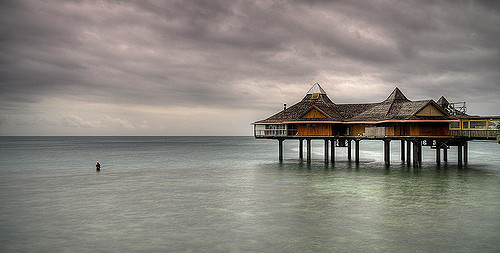French presence in the Pacific reinforced by the PIF
Posted By Paul Soyez on September 28, 2016 @ 11:00

France strengthened its South Pacific presence during the 47th Pacific Islands Forum (PIF) earlier this month, with New Caledonia and French Polynesia becoming full members of the organisation [1]. This double integration, supported by Australia, constitutes a victory for the French diplomatic strategy in the South Pacific.
France’s main ambition in the South Pacific is to normalise and reinforce its presence in the region [2]. More than a million French citizens live in the South Pacific, providing France with the second largest exclusive economic zone in the world [3]. Overseas territories play a key role in France’s global strategy, enabling the country to project its armed forces on every ocean and continent. They also constitute platforms for France’s defence strategy, based on deterrence, as the French nuclear testing sites have proved in the past.
France remains a Pacific power thanks to three Overseas Territories: New Caledonia, French Polynesia, and Wallis and Futuna. Each archipelago has a specific political status, with various levels of autonomy from Paris [4], and a different level of regional integration. Since the Noumea Accords in 1998, New Caledonia has benefited from high levels of political, judicial and administrative autonomy, with France only maintaining its sovereign defence and foreign policies. The territory’s status will change after the referendum that must be held before 2018 [5], which will result in either independence or greater autonomy within the French Republic.
French Polynesia constitutes an Overseas Community, with its own government and parliament since 2004. The territory is administratively but not politically autonomous. New Caledonia and French Polynesia were formerly associate members of the Pacific Islands Forum. Wallis and Futuna, a much more isolated territory closely administrated from Paris, became a Pacific Islands Forum Observer in 2006 [6].
Supporting South Pacific regionalism is a way for French policy-makers to make sure their country remains part of this inclusive dynamic, enabling Paris to maintain its presence in the Pacific. French policy-makers will therefore welcome the Forum’s decision to accept New Caledonia and French Polynesia as full members.
France’s determination to increase the regional integration of its Pacific territories also has financial and economic motivations. New Caledonia and French Polynesia are largely dependent on France for trade, investment and public funding, which is extremely costly for France. In 2010, for example, overseas territories cost France more than €7 billion [7]. For a country facing financial difficulties, such expenditures constitute a substantial investment. Moreover, both territories benefit from higher GDP per capita than their neighbours [8]. Better regional integration could improve the territories’ economies and make them less dependant on France’s budgetary support.
According to Philippe Germain [9], president of New Caledonia, the decision of the PIF to allow full membership has been possible because governments in Paris, Noumea and Papeete have successfully convinced member states that France’s delegated sufficient authorities to these territories. New Caledonia and French Polynesia have claimed that they will pursue their own interests and not the ones of mainland France. These assertions could be questioned, as overseas communities remain part of the French Republic and remain at least partly tied to its interests. In fact, several members of the Forum were concerned that accepting these territories as full members would reinforce France’s influence over these archipelagos, to the detriment of local pro-independence parties. However, New Caledonia and French Polynesia convinced the majority of countries, including Vanuatu, Papua New Guinea, New Zealand and Australia.
During his visit to Australia and New Zealand last May [10], French Prime Minister Manuel Valls confirmed that France sought to see its two Pacific territories become full members of the PIF. Malcolm Turnbull and John Key expressed their support for France’s ambitions.
Australia has defended [11] the French territories’ full memberships for two reasons. First, supporting France’s goals in the region strengthens the strategic partnership between the two countries, including a high level of political and diplomatic cooperation manifested by Australia’s recent submarine contract with French public shipbuilder company DCNS. Second, Canberra’s strategy is also to reinforce its economic cooperation with Noumea and Papeete in order to benefit from their natural resources. Philippe Germain will officially visit Canberra [9] in October to demonstrate his territory’s interest in expanding its relations with Australia, especially those pertaining to investment and trade. Australia’s support for France’s strategy in the South Pacific is important because it shows Canberra’s desire to see a French presence remain in New Caledonia after its referendum on independence.
France’s Pacific strategy seems to be fruitful. The Forum’s decision illustrates how France’s contribution to the South Pacific’s security and development is increasingly valued. It particularly demonstrates that Canberra and Paris have aligned their regional strategies for the security of the South Pacific.
Article printed from The Strategist: https://www.aspistrategist.org.au
URL to article: https://www.aspistrategist.org.au/french-presence-pacific-reinforced-pif/
URLs in this post:
[1] New Caledonia and French Polynesia becoming full members of the organisation: http://www.forumsec.org/resources/uploads/embeds/file/2016-communique-working-19-09-2016.pdf
[2] reinforce its presence in the region: http://www.lnc.nc/article/pays/politique/des-senateurs-voient-un-besoin-de-france
[3] largest exclusive economic zone in the world: https://en.wikipedia.org/wiki/Exclusive_economic_zone#France
[4] specific political status, with various levels of autonomy from Paris: http://www.collectivites-locales.gouv.fr/statuts-nouvelle-caledonie-et-polynesie
[5] the referendum that must be held before 2018: http://www.policyforum.net/voting-for-new-caledonias-future/
[6] became a Pacific Islands Forum Observer in 2006: http://dfat.gov.au/geo/wallis-futuna/Pages/wallis-and-futuna-country-brief.aspx
[7] 7 billion: http://www.lefigaro.fr/economie/2009/02/11/04001-20090211ARTFIG00602-l-outre-mer-coute-pres-de-sept-milliards-a-l-etat-.php
[8] higher GDP per capita than their neighbours: http://www.ac-noumea.nc/spip.php?article115
[9] According to Philippe Germain: http://www.lnc.nc/article/pays/politique/a-part-entiere-dans-le-forum-du-pacifique
[10] During his visit to Australia and New Zealand last May: http://www.outre-mer.gouv.fr/?le-processus-d-integration-de-la-nouvelle-caledonie-et-la-polynesie.html
[11] Australia has defended: http://www.presidence.pf/index.php/pr-presidence/3055-la-polynesie-francaise-devient-membre-a-part-entiere-du-forum
Click here to print.